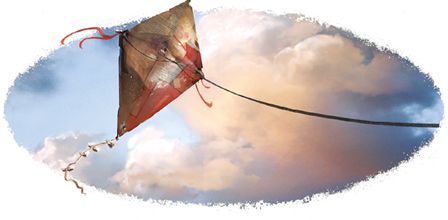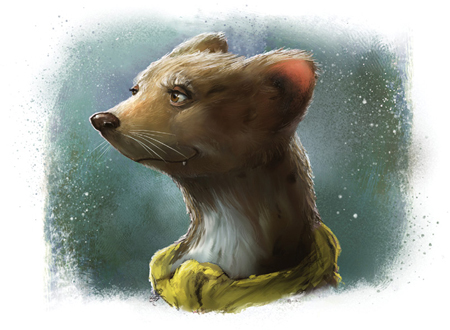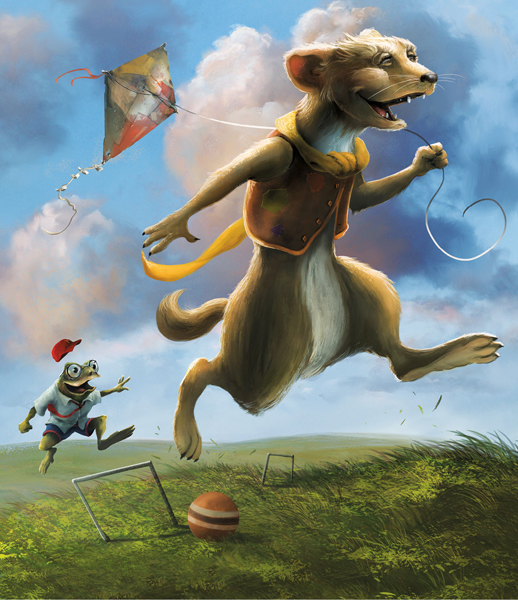
CHAPTER NINE
The Small, Bedraggled Weasel

In which Humphrey makes a new friend. (Always a good thing.)
The adult supervision of Humphrey was, from time to time, somewhat lax, what with his mother in Italy, his uncle in Cambridge, and his temporary guardians messing about in boats. In their defense, Mole and Rat did visit him daily, and invited him over for tea, and joined him in rousing games of croquet and cricket and lawn bowls. The butler and the housekeeper and Cook, of course, checked on him frequently during the day, but were preoccupied by their duties of office. In consequence, there were many hours when Humphrey was left all alone, which he did not mind in the least, for he was by temperament a bookish child, and the child who is at home in the world of books never lacks for companionship, entertainment, or adventure.
For a while, he busied himself with the matter of replacing all the equipment that had been pulverized in the blast. He spent many long, satisfying hours poring over catalogs and ordering exotic pieces of glassware and other paraphernalia. He also ordered questionable chemicals and certain interesting substances which perhaps, strictly speaking, a toad of his tender years should not have had access to. However, in his favor, it must be said that he strictly observed all protocols for safe handling (unlike some creatures we could name).
One lazy afternoon, Humphrey wandered down to the kitchen to beg some baking soda from Cook for one of his experiments.36 There he arrived unexpectedly in the middle of a violent scene. The butler, the cook, and the scullery mouse had cornered a small, bedraggled weasel who was crying so piteously and profusely that the fur down his front was all soaked through.37
Cook, a large, round hedgehog, spluttered, “We caught him pinching apples in the orchard, Master Humphrey, all red-handed.38 The very idear!” She turned to the cowering creature. “Why, I’ve a good mind to turn you over to the law, you rotten little sneak thief.” And with this, she drew back her meaty paw and delivered a good clout to the small, bedraggled weasel’s ear.
He wailed, “I-I-I’m sorry. Me mam sent me to pick up the windfalls so she could bake an apple tart for me brother’s birthday. I didn’t mean no harm. It’s just that it’s Jimmy’s birthday and all, and there’s no money for a proper birthday cake, so me mam sent me for the windfalls. She said not to take nuffing from the trees, and I didn’t. It was only the old mealy ones off the ground. Please, missus, I’m so sorry,” he sobbed.
“You’re nothing but a sneak thief. The very idear,” said Cook, who seemed to have a limited vocabulary for describing dastardly deeds. She aimed another cuff at the cowering creature. Humphrey, who had never in his life suffered the lack of a birthday cake, was moved by the plight of the evildoer, who was guilty, after all, of only the most trivial of misdemeanors.
“Cook,” said Humphrey, “do you use the windfalls for anything?”
“What?” said Cook. “What’s that, Master Humphrey?”
“Do you use the windfalls in making your tarts?”
“I most certainly do not. None of that wormy old muck for the likes of you gentlemen. The groom feeds ’em to the horses.”
The weasel, who really was pitifully small and thoroughly bedraggled, looked at Humphrey in mute appeal.
Humphrey said, “Perhaps we could allow him a few apples for his brother’s birthday tart. Couldn’t we do that?”
“It’s Professor Toad’s property,” huffed Cook. “It’s the principle of the thing. The very idear.”
“I think that in this case we could overlook such a minor transgression, don’t you agree?” said Humphrey. “Just this once.”
“Well,” said Cook, “I never.”
Humphrey plucked a basket from the counter and said to the weasel, “Come along, you. Let’s get your brother some apples, shall we?” He unlatched the door and went out through the kitchen garden, the weasel tripping hard on his heels, making stuttering pronouncements of apology and gratitude.
“Oh, Master Humphrey,” he said, “I’m ever so grateful.”
Humphrey looked at the weasel, who, despite his diminutive build, appeared to be about his own age. “Look here,” said Humphrey, “let’s not have any of that young master stuff. You can call me Humphrey. What’s your name?” And he proffered a paw in friendship.
“Sammy, sir.”
“And no sirring, either.”
“Yes, s— Yes, Humphrey.” They shook paws and made their way to the orchard.
“Rightio,” said Humphrey. He examined the unappealing condition of the apples on the ground and said, “I think your brother deserves better than these. It’s not every day one celebrates one’s—How old did you say he’s turning?”
“Six, Humphrey.”
“Six, then. It’s not every day one turns six. It’s a very important birthday. Let’s get him some proper ones off the tree, shall we?”
Together they filled up the basket with the finest specimens picked from the branches. Sammy staggered off with his laden basket, enough for several tarts, calling out many pledges of gratitude and friendship over his shoulder as he tottered away.

Later that evening the basket was returned to the kitchen door. It contained a warm apple tart wrapped in a tea towel, the fruit delicately scented with cinnamon, the crust a perfect golden brown. Even Cook had to admit it was a paragon of the baker’s art.39
* * *
The following day, Humphrey and Sammy spent a jovial hour building a kite out of newspaper and lengths of balsa wood and flour-and-water paste, which stuck dreadfully to Sammy’s fur.40 In consequence, Humphrey ended up doing most of the pasting. But then, when it was time to launch the kite, Sammy (who was by far the better runner) did the honors and bolted across the croquet lawn towing the kite behind him. After several exhausting sprints, the wind finally caught it and chucked it higher and higher as if amusing itself. The kite waggled its tail and tugged thrillingly on its long string like a living thing. They took turns flying it until the wind decided it had enjoyed enough of a frolic with them and departed for other chums and other kites.

By then it was time for afternoon tea, which they took on the terrace.
Sammy eyed the biscuits.41 Humphrey noted this and said, “Dig in, Sammy. No need to hold back. There’s plenty.” They ate and drank their fill, if not a bit more, then lay back in their wicker chairs and stuporously observed the dumpling clouds overhead.
After a while, Humphrey sighed happily and said, “There is nothing so grand as messing about with kites. Unless, of course, one could actually fly. It’s such a shame about my uncle’s balloon. He had a big yellow balloon, you know, but it escaped before I had a chance to try it out. I bet I could make it fly again. That’s if it’s ever found.”
“But it is found,” said Sammy. “I’ve seen it.”
“What?” said Humphrey, with a jolt. “You’ve seen it? Is it all right? It’s not all smashed up, is it?”
“There’s a hole in the basket,” said Sammy. “One side of it’s all shoved in. And there’s lots of rips in the balloon that’s got to be mended.”
Humphrey said, “Why don’t you bring it in and claim the reward? It’s a whole pound, you know.”
“I did try,” admitted Sammy, “but I couldn’t lift it. It’s far too heavy for me to carry on me own.”
Humphrey pondered this for a moment and said with mounting excitement, “Perhaps if I borrowed a wheelbarrow from the gardener, you and I could retrieve it together and split the reward. What d’you say, Sammy? Would that be fair?”
“Oooh, yes, immensely fair, Humphrey.”
And although Humphrey was not by nature a greedy young toad, his eyes lit up at the thought of all the fascinating scientific equipment he could buy with half a pound. There was also the thought of the glory entailed in resurrecting his uncle’s expensive lighter-than-air craft, and the opportunity to work on a project that would hone his engineering skills.
“By the way,” said Humphrey, “where is it? Is it far?”
Came the reply: “It’s in the middle of the Wild Wood.”